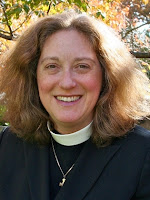 |
| The Rev. Deborah Meister |
Last week, we received news of the death of one of our parish matriarchs, a woman who had been a member of our parish for eighty-nine years. She had worked at the parish for many years, volunteered at the parish, and continued to serve the parish community as she was able until the last year of her life, carrying out a pastoral ministry with sensitivity and loving care.
Like many of our seniors, she had moved to a retirement community in the last years of her life, one which she loved deeply and where she found friendships, intellectual stimulation, and joy. And it was there that her funeral was held, among the friends of her last couple years rather than among the friends of her lifetime.
It was a beautiful service – heartfelt, warm, a joyful remembrance of a wonderful person – but it also made me think about the ways we honor or fail to honor friendship in our culture and in our churches. American culture tends to prioritize the family above all else. If someone loses a husband or a wife, a child or a parent, the community knows to gather around them, support them, say kind things, and make allowances for some erratic behavior in the weeks and months to come. If someone loses a friend – even a friend of their right hand, someone who has been central to their lives for many years – we do not have customs for honoring that loss. Often, we do not even have ways to speak of that loss. We may feel reluctant even to tell a boss or a colleague that we are grieving, because our culture does not really allow space for a friend to grieve.
I think that, for the elderly, these trends are often magnified by our culture of housing our seniors in care communities. While many of these communities do excellent work, tending and nurturing the bodies and spirits of people who would not be safe or cared for on their own, transitioning into such communities can take a toll on the relationships that have sustained us through a lifetime. There is no guarantee that any of us will spend our last years in the same facility as our friends, and, particularly if we are mobility challenged, it can be hard to maintain those relationships. The phone and internet allow some continued contact, but they are not adequate substitutes for face-to-face conversation.
Perhaps it is time for us to be more assertive about the claims of friendship on our lives. Apart from our spouses or partners, our relatives are people we did not choose, but our friends are the people to whom we have willingly entrusted our souls. We can be open, at least in our parishes, about our times of grief and joy. We can make plans with our friends so that our latter years are spent together, and not apart. And we can be intentional about honoring the ways that our friends teach to love others and to love Christ.
Aelred of Rievaulx sees friendship as a training ground for the next life, writing, “in friendship are joined honor and charm, truth and joy, sweetness and good-will, affection and action. And all these take their beginning from Christ, advance through Christ, and are perfected in Christ. Therefore, not too steep or unnatural does the ascent appear from Christ, as the inspiration of love by which we love our friend, to Christ giving himself to us as our Friend for us to love...And thus… ascending from that holy love with which [we] embrace a friend to that with which [we] embrace Christ, [we]will joyfully partake in abundance of the spiritual fruit of friendship, awaiting the fullness of all things in the life to come...and God shall be all in all.”
Deborah Meister is the rector at St. Alban's in Washington, DC. Share your reactions, reflections, and comments to her post on Facebook.